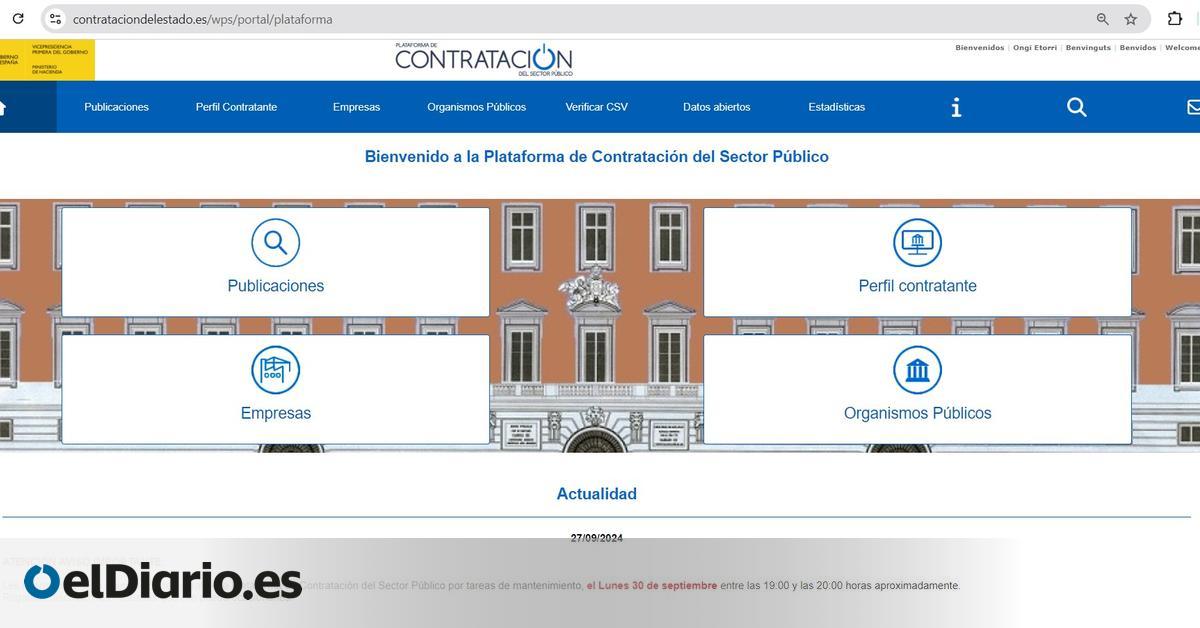
Hundreds or thousands of public contract award minutes have ceased to be available in recent days on the Public Sector Contracting Platform (PLACSP), the official portal that daily publishes the tenders of a large part of the public institutions in Spain. The disappearance of information has been massive and this has been confirmed by elDiario.es, in a problem that even affects contracts awarded this year. The Ministry of Finance, responsible for this website, assures that this is a specific event that will be resolved shortly and is due to an “update” of that tool. It also declines to specify how many contracts it may affect.
This Friday, the platform announced a “temporary interruption” of the service “for maintenance tasks, on Monday, September 30 between approximately 7:00 p.m. and 8:00 p.m..” The stoppage, confirmed by the Treasury, has been scheduled to fix this situation. “All the documents will be visible again because none have been lost.”
The Ministry acknowledged on Thursday, when asked by this newspaper, that “there are several public documents that are not visible, but that have not disappeared. “They are still present in the infrastructure with their time stamp, which guarantees both integrity and authenticity.”
He attributed it to “a technological update of the logical architecture of the Platform. One of the pieces that has been replaced recently has been the repository in which public documents are stored. This has caused some documents, from time to time, to be migrated as non-visible. “Those documents have not been lost, and they will be recovered,” the Treasury insisted, without specifying deadlines.
Asked if instead of “some documents” there were thousands of documents, the Ministry did not answer.
The minutes include, among other data, the date and place of awarding the contracts, those responsible for that decision and the criteria used to adopt it. The National Markets and Competition Commission (CNMC) usually collects them as evidence of possible irregularities in its files. Not publishing them violates article 63 of the Public Contracts Law, which requires maintaining all contract information in the contractor’s profiles for at least five years, including “all minutes of the contracting table related to the award procedure.”
Everything indicates that this problem is affecting a massive number of tenders, although not those published in recent weeks. This Friday, in a random consultation on a hundred formalization or award minutes, elDiario.es was only able to access around 10% of the documents.
It happened with contracts awarded in 2018, in 2019, in 2021, in 2022, in 2023 or even this same year. In all cases, the response from the website was the same when trying to download the minutes: “The requested document is not available because the advertisement that contains it has been canceled by the contracting body or the tender has been archived by an administrator “, the platform told the user.
The problem affected very different Administrations and different dates: contracts awarded to the Galician businessman César Blanco (former official of the PP of Ourense who has received awards and subsidies for close to 100 million); to the multimillion-dollar emergency orders from the Ministry of Health to purchase masks and gloves or respirators in 2020, at the worst of the pandemic; to the multimillion-dollar contract awarded a year ago by the Madrid City Council for the construction of the Santiago Bernabéu parking lot, valued at more than 600 million…
Artificial intelligence
This blackout has come at a time when the CNMC is using artificial intelligence tools through its Economic Intelligence unit to detect possible signs of collusion in public tenders and carry out preventive actions. He is doing it “with very good results,” he said a few days ago. the president of this organizationCani Fernández, in an appearance in Congress in which he recalled the importance of competition in this activity, which can represent 20% of the GDP.
The regulator’s Competition Directorate recalled this Friday that “the CNMC is not responsible for the management or operation of the State contract platform, so we do not have the authority to determine its operation. However, at the CNMC we periodically download said database and store the information on our own servers. Therefore, our database should not be affected by problems on the original platform.”
The state platform contains all contracts awarded since 2014, which can be accessed for free, unlike what happens with other official databases, such as the Commercial Registry, whose information in Spain is paid for unlike which happens in other countries like Luxembourg.
The website allows companies to electronically submit to bidding processes, request information or receive notifications about changes to the tenders. However, over the years it has become a computer nightmare.
If in 2018 82,179 contract awards were published in it, in 2023 the figure was more than double, 198,967. The economic volume of contracts awarded since 2018 reaches 360,000 million euros, excluding taxes, which represents approximately 36% of Spain’s GDP in one year. In recent years, more than a million contracts have been published on this website, so it is not unreasonable that these days tens of thousands of minutes have ceased to be accessible after this “update”.
The Treasury has been building a gigantic infrastructure on technological foundations that were not designed to sustain the current volume of publications, consultations and communications.
The result is that the platform can take 45 seconds to respond to the search for a given file, offering results that vary depending on whether accent marks are entered or not, or presenting the information in a way that is almost impossible to consult from a mobile phone. or with links that self-destruct after two minutes. This makes it impossible to make an index of information to consult it later or share it with third parties.
The latest “update” of this website and this massive disappearance of documents comes after the Budgets for 2023 approved in November 2022 included an item, the amount of which the Treasury did not specify, to “urgently undertake the technological renewal” of the obsolete platform , in a project with a horizon of 4-6 years to carry out a “complete renovation”.
The website depends on the General Directorate of Assets of the Ministry of Finance, and specifically, the General Subdirectorate for the Coordination of Electronic Contracting. And it has been repeatedly criticized by companies and transparency experts for the difficulties it imposes in accessing public tender data.
“Very opaque”
“They are very opaque, it is very old,” summarizes data engineer and public procurement expert Manuel García, who has detected cases of tenders that included the names of the winners in the specifications. This Friday, the minutes of several of those contracts had disappeared.
Regardless of this incident that the Treasury promises to solve, today on this website it is still impossible for a citizen to search for something as basic as contracts awarded to a certain CIF, the code that uniquely identifies a company in Spain. It is only possible to do so by company name. This sometimes gives very imprecise results, in case of coincidence with another company name.
They do allow you to search by CIF for a long time, autonomous platforms such as those of Catalonia, Comunitat Valenciana or the Community of Madrid. Others are even more opaque than the state one and do not allow searching even by the name of the successful bidder. This occurs, for example, with that of the Xunta de Galicia.
In 2022, the Government recognized that the technological architecture of the platform was then unsustainable. “With the current technological infrastructure, it will be practically impossible to cope with maintaining the levels of availability and performance demanded by the different types of PLACSP users,” he admitted in the draft Budget for 2023.
The risk was that the system could not sustain the exponential growth it had had. Two years later, it continues to cause problems, in a country that is among the few in the Organization for Economic Cooperation and Development (OECD) that has not yet approved a national strategy against corruption, in which public contracts should be key . The deadline to finalize this document, demanded among others by organizations such as the Court of Auditors, expired a few weeks ago.
Source: www.eldiario.es

